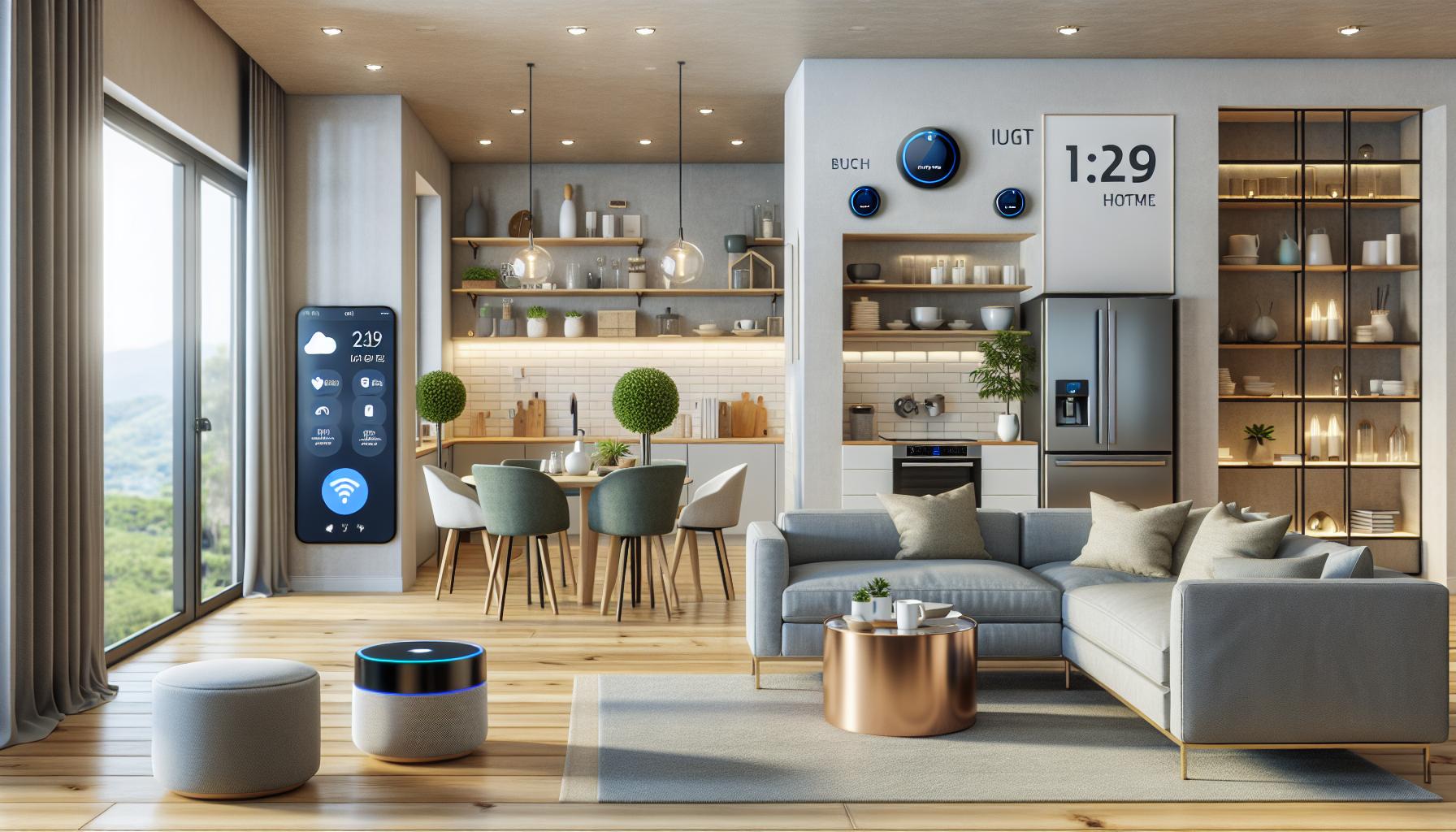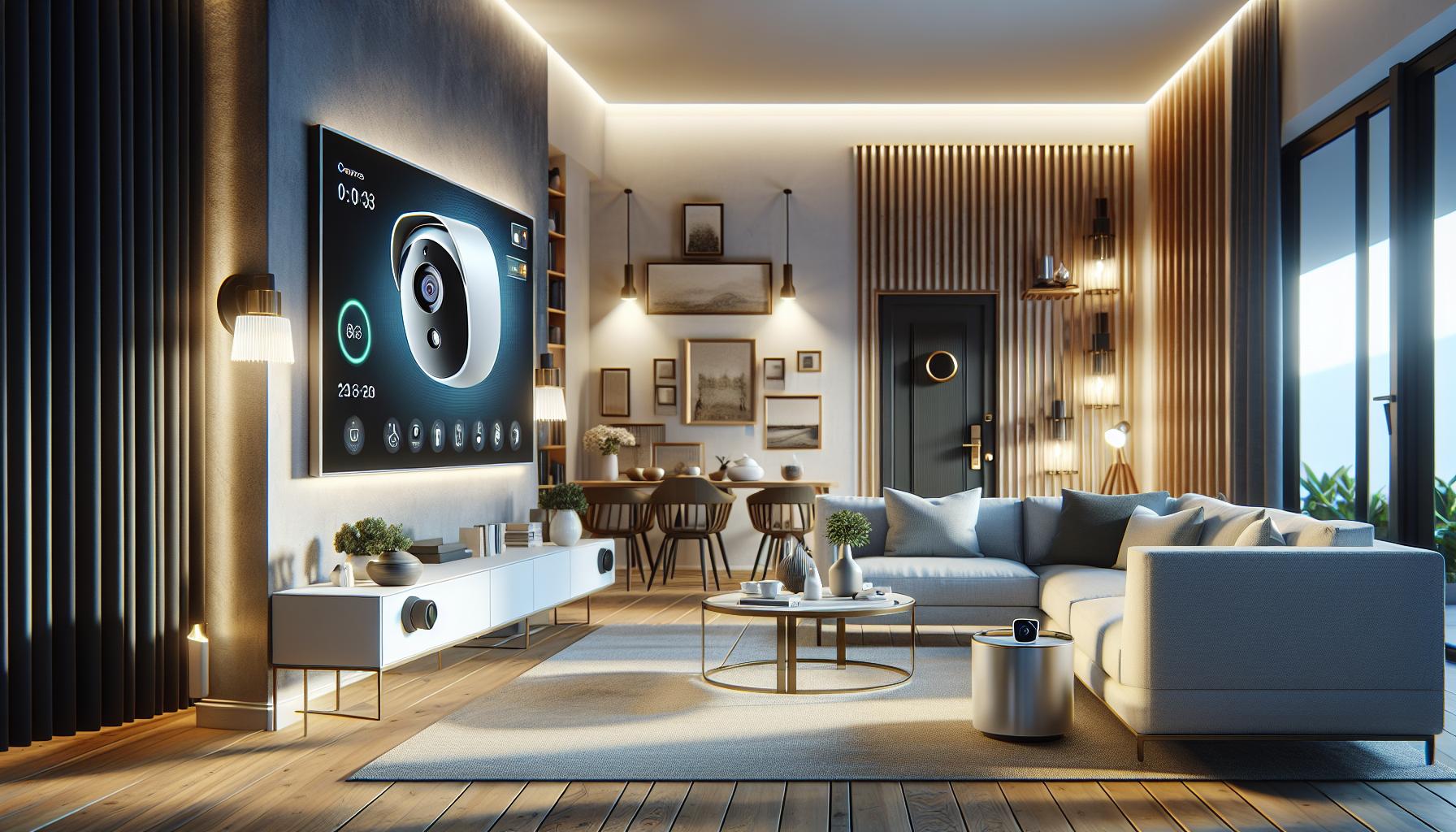Key Takeaways
- Seamless Integration: Future smart home gadgets will integrate advanced technologies to enhance convenience, efficiency, and comfort in daily living.
- AI and IoT Advancements: Artificial intelligence and the Internet of Things will be key drivers in optimizing energy use, learning user preferences, and improving security systems.
- Enhanced Security Features: Smart security systems will utilize AI for real-time alerts, facial recognition, and remote access, ensuring a higher level of home security.
- Energy Efficiency: Future devices, such as smart thermostats and intelligent lighting, will monitor and adapt energy usage to promote sustainability and reduce utility costs.
- Health Monitoring Capabilities: Gadgets that track air quality and living conditions will encourage healthier habits and provide insights that improve overall well-being.
- Communication and Compatibility: The importance of compatibility among devices will increase, necessitating the use of centralized hubs for efficient control and management of a unified smart home ecosystem.
As technology continues to evolve, the concept of a smart home is becoming more accessible and exciting. Future smart home gadgets promise to revolutionize the way people live, making daily tasks easier and enhancing overall comfort. From intelligent lighting systems to advanced security features, these innovations are designed to seamlessly integrate into everyday life.
Imagine a home that anticipates needs, learns preferences, and optimizes energy use—all while providing a secure environment. With the rise of artificial intelligence and the Internet of Things, the possibilities are endless. As consumers become more tech-savvy, the demand for these cutting-edge devices will only grow, shaping the future of home automation.
Future Smart Home Gadgets
Future smart home gadgets promise to revolutionize home living through seamless integration of technology. These devices will emphasize user convenience, efficiency, and energy management, significantly enhancing daily routines.
Intelligent Lighting Systems
Intelligent lighting systems utilize adaptive technology to adjust brightness and color based on individual preferences and time of day. These systems provide remote access, allowing users to control lighting via smartphones or voice commands, facilitating energy savings.
Advanced Security Features
Advanced security features will encompass smart locks, video doorbells, and surveillance cameras that utilize AI for real-time alerts. Integration with mobile devices ensures homeowners receive immediate notifications of any security breaches, enhancing overall safety.
Smart Appliances
Smart appliances, including refrigerators, ovens, and washing machines, will enable users to monitor and control food storage and cooking processes. These appliances offer energy-efficient options and adaptability, optimizing kitchen tasks seamlessly.
Climate Control Technologies
Climate control technologies will focus on smart thermostats and sensors that learn resident behaviors. These gadgets optimize heating and cooling for comfort while promoting energy efficiency, thereby reducing utility costs.
Health Monitoring Devices
Health monitoring devices will enter homes to track wellness metrics such as air quality, humidity, and temperature. These gadgets will provide insights into living conditions that affect health, encouraging better habits and lifestyle choices.
Energy Management Systems
Energy management systems will play a vital role in monitoring power consumption. These systems enable homeowners to analyze energy usage patterns, adjust settings, and lower costs while contributing to environmental sustainability.
Home Automation Hubs
Home automation hubs will serve as control centers, allowing users to manage all smart devices from one application. These hubs streamline operations, improve connectivity, and enhance user experience by enabling automated routines.
Voice Assistants
Voice assistants will evolve to incorporate more languages and accents. Future iterations will engage in sophisticated conversations, offering personalized recommendations and control over home devices through natural language processing capabilities.
These future smart home gadgets will significantly influence home automation, providing smarter living environments that adapt to user preferences and promote efficiency.
Emerging Technologies

Emerging technologies play a crucial role in shaping future smart home gadgets. Innovations such as artificial intelligence and the Internet of Things are creating smarter, more efficient living environments.
Artificial Intelligence Integration
Artificial intelligence (AI) drives the evolution of smart home gadgets. AI systems analyze user behavior, predict preferences, and automate functions. For example, smart thermostats learn temperature settings over time, optimizing energy use efficiently. AI-driven security cameras can identify familiar faces, reducing false alerts and enhancing safety. Furthermore, voice-activated assistants continually improve understanding, providing personalized responses and managing various smart devices seamlessly.
Internet of Things (IoT) Advancements
The Internet of Things (IoT) connects various smart devices, enabling them to communicate and share data. IoT advancements facilitate real-time monitoring of home systems, such as energy use and security status. For instance, smart refrigerators can notify users about expiration dates and suggest recipes. Home automation hubs consolidate control, allowing users to manage multiple devices through a single interface. IoT advancements enhance integration among smart appliances, improving efficiency and convenience in daily tasks.
Popular Future Smart Home Gadgets

Future smart home gadgets focus on enhancing security and energy efficiency, shaping a new era of home automation. These devices promise to deliver convenience and sustainability in everyday living.
Smart Security Systems
Smart security systems integrate advanced technologies to provide comprehensive home protection. Features include AI-driven surveillance cameras that utilize facial recognition and motion detection to alert homeowners of any unusual activity. Smart locks offer keyless entry, enabling remote access and monitoring. Additionally, connected doorbells with cameras allow homeowners to see and communicate with visitors from anywhere, promoting increased safety. Many of these systems boast the capability to integrate with other smart devices, offering a cohesive security experience throughout the home.
Energy-Efficient Devices
Energy-efficient devices leverage smart technology to reduce energy consumption and promote sustainability. Smart thermostats adjust temperature settings based on user preferences and behavior, optimizing heating and cooling. Intelligent lighting systems adapt their brightness and color, reducing energy usage by adjusting to natural light levels. Energy management systems monitor appliance usage, providing insights to help homeowners make informed decisions on energy consumption. Such devices contribute to lower utility bills and a decreased environmental footprint, aligning with the growing demand for sustainable living solutions.
Benefits of Future Smart Home Gadgets

Future smart home gadgets offer numerous benefits that enhance daily living experiences. These innovations streamline tasks, improve security, and create more energy-efficient homes.
Enhanced Convenience
Enhanced convenience emerges as a key benefit of future smart home gadgets. Smart devices automate daily routines, reducing the time spent on mundane tasks. For instance, intelligent lighting systems adjust automatically based on occupancy, eliminating the need for manual switches. Smart appliances optimize cooking processes, providing step-by-step assistance for various recipes. Voice-controlled assistants allow users to manage home systems hands-free, fostering a seamless lifestyle. Additionally, real-time notifications alert homeowners to important events, such as deliveries or security incidents, ensuring they stay connected and informed.
Improved Security
Improved security represents another significant advantage of future smart home gadgets. Advanced smart security systems create comprehensive protection through high-tech features. AI-driven surveillance cameras utilize facial recognition technology to identify threats accurately, while motion detection sensors alert homeowners of unusual activity. Smart locks enable keyless entry, granting remote access for trusted visitors without compromising safety. Furthermore, connected doorbells with cameras facilitate two-way communication, allowing homeowners to interact with guests, even when not home. These systems promote peace of mind by ensuring a safe living environment at all times.
Challenges and Considerations
Smart home gadgets introduce various challenges that users must navigate, particularly concerning privacy and compatibility.
Privacy Concerns
Privacy concerns arise as smart home gadgets collect, store, and share personal data. Devices such as smart speakers, security cameras, and health monitors often require constant internet connectivity, increasing exposure to unauthorized access and data breaches. According to a study by Cybersecurity & Infrastructure Security Agency (CISA), many households underestimate the risks of hacked devices. Proper security measures, such as strong passwords and regular firmware updates, significantly mitigate these risks, while users should review privacy policies to understand data usage. Consumers who value privacy might prefer devices with enhanced security features, such as local data processing.
Compatibility Issues
Compatibility issues can hinder the seamless integration of smart home gadgets. Devices from different manufacturers may not communicate effectively, resulting in fragmented user experiences. The lack of universal standards in the smart home market complicates device pairing and automation setups. According to a report by the Consumer Technology Association (CTA), only 45% of smart home users experience complete integration among their devices. To address this challenge, opting for products that support common protocols, such as Zigbee, Z-Wave, or Wi-Fi, promotes better interoperability. Users also benefit from using a centralized hub that connects and manages diverse devices, simplifying control over the smart home ecosystem.
Enhanced Comfort, Security, And Energy Efficiency
The future of smart home gadgets is bright and full of possibilities. As technology continues to advance, homes will become increasingly intuitive and responsive to individual needs. Enhanced comfort, security, and energy efficiency will redefine daily living, making routines simpler and more enjoyable.
Emerging innovations will not only streamline tasks but also promote sustainability and wellness. With the integration of AI and IoT, homeowners will experience a seamless connection to their environments, allowing for real-time monitoring and automation.
As these technologies evolve, the demand for smart home solutions will only grow. Embracing these advancements will lead to smarter living spaces that adapt to preferences and enhance overall quality of life.



